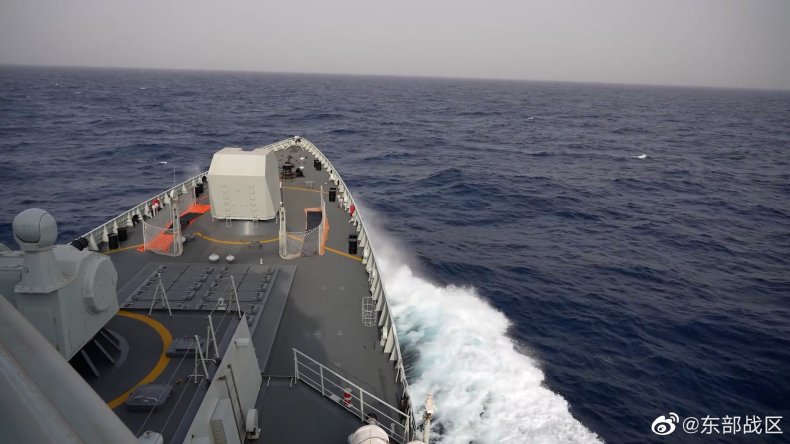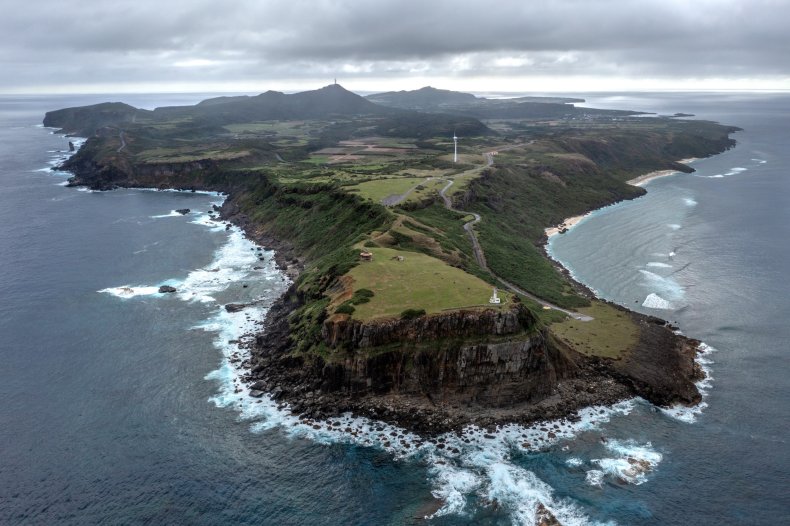Japan Seeks Calm Ahead of Pelosi Visit, ‘Concerned’ as China’s Forces Near
Japan has conveyed concerns over military exercises being held by Chinese armed forces near Japanese waters as international tensions continue to simmer over the recent trip to Taiwan by U.S. House Speaker Nancy Pelosi, who will travel to Tokyo in the final leg of her Asia tour.
A Japanese official told Newsweek that the Japanese government was “not in a position” to comment on Pelosi’s trip to Taiwan itself, but would weigh in on the regional fallout as the Chinese People’s Liberation Army began a series of drills set to surround the disputed island and extend into Japan’s claimed economic exclusion zone.
“We are concerned that Beijing has announced various military activities,” the Japanese official said. “Moreover, the area that China announced for its military drills includes Japan’s EEZ [Exclusive Economic Zone].”
The official also laid out Tokyo’s hopes for calm in the Taiwan Strait and said concerns have been conveyed to Chinese counterparts.
“The peace and stability of the Taiwan Strait is critical to the security of Japan as well as the region, and the issue surrounding Taiwan needs to be resolved in a peaceful manner,” the official said. “Already we have expressed our concerns to China.”

Eastern Theater Command/Chinese People’s Liberation Army
Chinese Foreign Ministry spokesperson Hua Chunying has hit back at Japanese protests over the sweeping People’s Liberation Army maneuvers, which she called “necessary and legitimate as a response to the major provocation of the U.S. side and the ‘Taiwan independence’ forces and as a step to firmly uphold China’s sovereignty and territorial integrity.”
She said that Chinese authorities had issued safety alerts and navigation warnings ahead of the exercises and that Beijing did not recognize Tokyo’s maritime claims as the two sides have failed to reach an agreement mapping them out.
“Since China and Japan have not yet carried out maritime delimitation in relevant waters, China does not accept the notion of so-called ‘Japanese EEZ,'” Hua said. “The Chinese side urges Japan to uphold the one-China principle and the spirit of the four political documents between the two countries and be prudent on the Taiwan question.”
Japan cut official ties with Taiwan in favor of mainland China half a century ago in 1972, the same year that Washington and Beijing signed the first of three joint communiques that would ultimately lead the U.S. to do the same seven years later. Both Washington and Tokyo maintain informal relations with Taipei, however, angering Beijing, which continues to claim Taiwan as its own and has threatened reunification by force if diplomacy did not work.
China and Japan also have their own territorial disputes, most notably over the Pinnacle Islands, known to Japan as the Senkakus and China as Diaoyu Dao. Taiwan claims the islands as well, calling them Diaoyutai. Japan’s Coast Guard has regularly reported run-ins with Chinese vessels near the disputed islands, prompting diplomatic grievances.
And while Japan, like most U.S. allies, has avoided speaking directly on Pelosi’s controversial travel to Taiwan on Tuesday, the first trip of its kind for a House of Representatives speaker in 25 years, the country did join the rest of the G7, which includes Canada, the European Union, France, Germany, Italy, Japan, the United Kingdom and the U.S., in condemning China’s military response.

Carl Court/Getty Images
“We are concerned by recent and announced threatening actions by the People’s Republic of China (PRC), particularly live-fire exercises and economic coercion, which risk unnecessary escalation,” the statement issued Wednesday said. “There is no justification to use a visit as pretext for aggressive military activity in the Taiwan Strait. It is normal and routine for legislators from our countries to travel internationally. The PRC’s escalatory response risks increasing tensions and destabilizing the region.”
The members called on China “not to unilaterally change the status quo by force in the region, and to resolve cross-Strait differences by peaceful means” and argued that “there is no change in the respective one China policies, where applicable, and basic positions on Taiwan of the G7 members.”
“We reiterate our shared and steadfast commitment to maintaining peace and stability across the Taiwan Strait and encourage all parties to remain calm, exercise restraint, act with transparency, and maintain open lines of communication to prevent misunderstanding,” the statement added.
After departing Taiwan, Pelosi arrived Wednesday in South Korea, which has also urged de-escalation.
“As a regional country, we hope that peace and stability in the Taiwan Strait will continue, and that cross-strait relations will develop peacefully through dialogue and cooperation,” a South Korean Foreign Ministry official told Newsweek.
President Joe Biden, who has not publicly endorsed Pelosi’s Taiwan trip and said last month that the military believed it was “not a good idea,” visited South Korea and Japan in May. The U.S. leader used the opportunity to reinforce the U.S. alliances with both nations and showcase his administration’s “Indo-Pacific” framework, a strategy widely viewed as being aimed at countering China’s influence in the region.

Comments are closed.